Xi meets Cambodian King
Chinese President Xi Jinping on Thursday met with Cambodian King Norodom Sihamoni.
Xi arrived here earlier on Thursday for a state visit.
Chinese President Xi Jinping on Thursday met with Cambodian King Norodom Sihamoni.
Xi arrived here earlier on Thursday for a state visit.

Chinese President Xi Jinping returned to Beijing on Friday afternoon after wrapping up state visits to Vietnam, Malaysia and Cambodia, the Xinhua News Agency reported on Friday.
During Xi's first state visits abroad in 2025, lasting from April 14 to 18, the Chinese leader was warmly welcomed by locals, overseas Chinese, and senior officials and leaders of the three neighboring countries.
Upon arrival, the Chinese president's signed articles were respectively published in local newspapers in the three countries. Reporters also noted that media outlets of Vietnam, Malaysia and Cambodia spoke highly and with anticipation of Xi's visits.
Analysts believe that the leader's visit has yielded fruitful results and holds profound significance, both for pragmatic cooperation in various bilateral fields and for regional stability and development.
They added that close interactions are the vivid practice of the philosophy of China's neighborhood diplomacy featuring "amity, sincerity, mutual benefit, and inclusiveness" proposed by Xi in 2013, and the guiding principle has continuously advanced China's relations with neighboring countries.
To date, China has reached consensus on building a community with a shared future with 17 neighboring countries and signed Belt and Road cooperation agreements with 25 of them. China is also the largest trading partner of 18 countries in the region, reflecting their deep and growing interdependence.
Comprehensive outcomes
During Xi's visit to Vietnam, the two sides signed 45 bilateral cooperation documents, covering areas including connectivity, artificial intelligence, customs inspection and quarantine, agricultural trade, culture and sports, public welfare, human resource development, media, and more. President Xi and Vietnamese leader To Lam also witnessed the launching ceremony of the China-Vietnam railway cooperation mechanism in Hanoi, Xinhua reported.
A joint statement released in the context of Xi's state visit to Vietnam on Tuesday said China and Vietnam have agreed to build a more extensive and in-depth all-round cooperation pattern, and accelerate synergy between their development strategies, according to Xinhua.
In Malaysia, his second stop, Xi met with King Sultan Ibrahim and held talks with Prime Minister Anwar Ibrahim. During the talks with Anwar on Wednesday afternoon, Xi said he is ready to work with Anwar to boost the high-level and strategic development of the China-Malaysia community with a shared future, Xinhua reported.
Following the leaders' talks, China and Malaysia exchanged more than 30 bilateral cooperation documents, covering cooperation in areas such as the three global initiatives, digital economy, trade in services, upgrading and development of "two countries, twin parks," joint laboratories, artificial intelligence, railways, intellectual property rights, agricultural products exports to China, mutual visa exemption and panda conservation, according to Xinhua.
During the Thursday talk with Cambodian Prime Minister Hun Manet in the third leg of his three-nation Southeast Asia tour, the two leaders agreed to build an all-weather China-Cambodia community with a shared future in the new era, and designated 2025 the China-Cambodia Year of Tourism.
The two countries exchanged more than 30 bilateral cooperation documents covering fields such as production and supply chain cooperation, artificial intelligence, development assistance, customs inspection and quarantine, as well as health and media.
Xu Liping, director of the Center for Southeast Asian Studies at the Chinese Academy of Social Sciences, told the Global Times that under the strategic guidance of head-of-state diplomacy, the latest visits have produced comprehensive and fruitful outcomes.
Xu highlighted the establishment of a China-Vietnam railway cooperation mechanism, as well as the "2+2" dialogue mechanism on diplomacy and defense with Malaysia and "2+2" foreign and defense ministers dialogue mechanism with Cambodia that was announced during the visit. He was also impressed by the enhanced cooperation in emerging fields such as artificial intelligence and the digital economy.
These achievements, Xu said, mark a new high in political and security cooperation, as well as in building resilient industrial and supply chains in emerging sectors between China and the three Southeast Asian countries.
Li Haidong, a professor at China Foreign Affairs University, told the Global Times that the outcomes of Xi's visits vividly and effectively embody the vision of a community with a shared future for mankind within the context of China's neighborhood diplomacy.
The visits have not only tightened multifaceted ties between China and the three countries, but also created a strong spillover effect across the region, Li said. "Deepened cooperation between China and the three Southeast Asian nations is expected to benefit a broader range of neighboring and regional countries."
Collectively responding to challenges
The state visits by the Chinese leader came against the backdrop of the US instigating a global tariff war, with Southeast Asian countries, as key links in the global supply chain, suffering a potentially heavy impact from the "reciprocal tariff" policy. Observers noted that in a world of growing turbulence, China's pursuit of building a new type of international relations based on win-win cooperation rather than "zero-sum" outcomes is increasingly significant, extending the impact of the Chinese leader's state visits far beyond the scope of bilateral relations.
According to the China-Vietnam joint statement released in the context of Xi's state visit to Vietnam, the two countries have vowed to jointly oppose hegemonism and power politics, all forms of unilateralism and all kinds of practices that jeopardize regional peace and stability. The two sides emphasized the importance of maintaining peace and security in the Asia-Pacific region and agreed to practice open regionalism, it said.
During the meeting with Xi, Anwar said that ASEAN will not endorse any unilaterally imposed tariffs, and will promote collective advancement through cooperation to maintain economic growth. Facing the rise of unilateralism, Malaysia is willing to strengthen cooperation with China to jointly address risks and challenges, Anwar added, per Xinhua.
In Cambodia, when meeting with Hun Manet, Xi said China and Cambodia, important forces in the Global South, should stick to the common values of peace, unity and cooperation. He called on both sides to oppose unilateral bullying, practice true multilateralism, and firmly oppose bloc confrontation, Xinhua reported.
Hun Manet said that amid global turbulence caused by unilateralism and shocks to the multilateral trading system, China has played a leading role and provided valuable stability to the world. The Cambodian Prime Minister added that Cambodia is willing to strengthen coordination and cooperation with China to safeguard their common interests, per Xinhua.
"US' unilateralism, trade protectionism, and hegemonism have brought tremendous uncertainty to global development," said Xu, "President Xi's visits sent a clear signal of strengthening regional cooperation, further solidifying consensus among countries and injecting new momentum into the region's stability and development."
Similarly, Li believes that China's close coordination and cooperation with neighboring countries, along with its positive spillover effects across the region, will enhance confidence among regional and global partners in the future of development.
Liu Ying, a researcher at the Chongyang Institute for Financial Studies, Renmin University of China, said Xi's state visits will not only promote deeper regional economic and trade development but will also help unite ASEAN and Asian countries to collectively respond to external challenges and play a vital role as a stabilizer and engine for the global economy.
Inheritance of Bandung Spirit
The day the Chinese leader concluded his visit to the three Southeast Asian countries also marked the 70th anniversary of the historic Asian-African Conference, also known as the Bandung Conference. The conference held in Bandung, Indonesia, on April 18 1955, marked the first time that the countries of the Global South united to oppose imperialism and colonialism in defense of their sovereign rights and a more equitable world. Representatives of 29 Asian and African countries proposed the Bandung Spirit with "solidarity, friendship and cooperation" at its core, initiating the Non-Aligned Movement and South-South cooperation, Xinhua reported.
"During his state visits, President Xi repeatedly stressed the importance of unity and cooperation among regional countries, and the need to oppose hegemonism and external interference," Xu said, "the Bandung Spirit continues to resonate strongly in the current global context."
Li emphasized that the visits once again demonstrated that China and other Global South countries form a community with a shared future, built on mutual support and solidarity, also with the common aspiration and interest in resisting hegemony and pursuing development together.
Xi's visits highlighted the need for closer coordination among developing countries to better safeguard their sovereignty, security, development, and well-being, Li added.
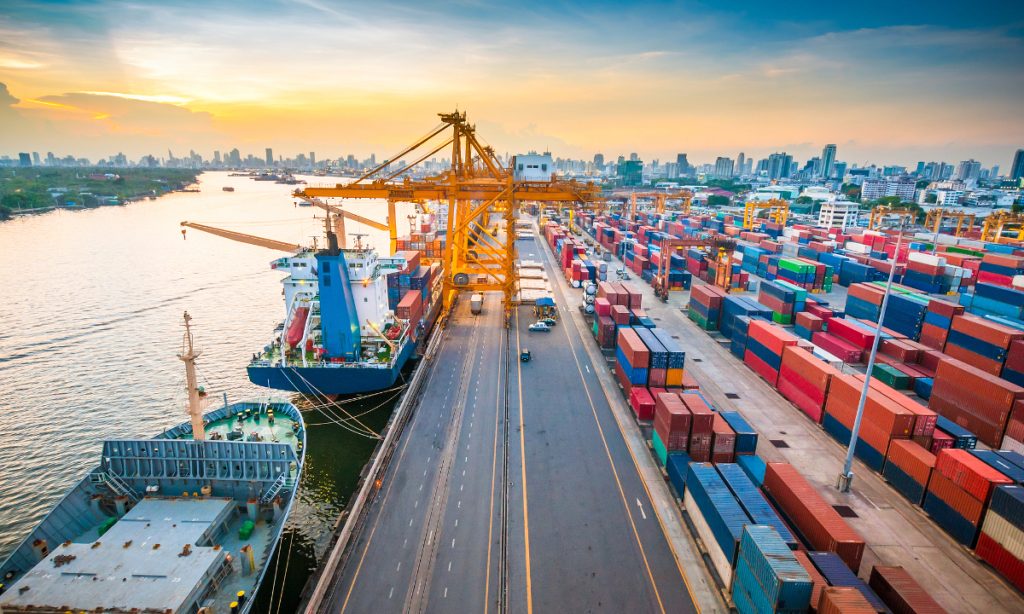
Chinese Foreign Ministry and Commerce Ministry on Tuesday vowed to take countermeasures to safeguard rights and interests, in response to US President Donald Trump's recent claims of escalating tariffs unless China withdrew its retaliatory tariffs against the US by April 8.
In a post on Truth Social on Monday, the US president has threatened China with an extra 50 percent tariff on goods imported into the US if China does not withdraw its 34 percent counter-tariff on US products, according to CNBC.
"We will not let anyone take away the Chinese people's legitimate right to development. We will not tolerate any attempt to harm China's sovereignty, security and development interests. We will continue to take resolute and strong measures to safeguard our legitimate rights and interests," Chinese Foreign Ministry spokesperson Lin Jian said in response at the regular Foreign Ministry press conference on Tuesday.
Lin said that judging from its actions, the US doesn't seem to be serious about having talks right now. "If the US truly wants to talk, it should let people see that they're ready to treat others with equality, respect and mutual benefit. If the US decides not to care about the interests of the US itself, China and the rest of the world, and is determined to fight a tariff and trade war, China's response will continue to the end," Lin said.
In a statement published on its website on Tuesday, China's Commerce Ministry said China will resolutely take countermeasures to safeguard its rights and interests should the US escalate its tariff measures.
Citing sources or experts, Niutanqin, one of the self-media accounts, posted on Tuesday that China could take six possible measures against the US' tariffs, including significantly increasing tariffs on US agricultural products such as soybeans and sorghum, banning US poultry imports, suspending China-US cooperation on fentanyl-related issues, imposing curbs on services trade with the US, reducing or banning the import of US films, and investigating the intellectual property benefits of US companies operating in China.
China will continue to take resolute measures to safeguard its legitimate and lawful rights and interests, Lin said on Tuesday, noting that the ministry does not comment on what's been said on the internet.
Escalated pressure
While showing no intention to pause the sweeping "reciprocal tariffs," Trump continues to intensify pressure on its trade partners including China, the EU, Japan and Canada.
"The European Union's been very bad to us," Trump told reporters at the White House, accusing European nations of not buying enough US goods. "They're going to have to buy their energy from us, because they need it and they're going to have to buy it from us. They can buy it, we can knock off $350 billion in one week," Reuters reported, citing the US president.
On Monday evening, the European Commission proposed its first retaliatory tariffs at 25 percent on a range of US imports in response to Trump's steel and aluminum tariffs, Reuters reported, citing an internal document. The tariffs on some goods will take effect on May 16 and others later in the year, on December 1, the document said, Reuters reported.
In addition, Trump wrote in another post on Truth Social on Monday that Japan has "treated the US very poorly on Trade. They don't take our cars, but we take MILLIONS of theirs."
The US Department of Commerce, as part of an annual review process, plans to hike duties on Canadian lumber from 14.4 percent to 34.45 percent, CNN reported on Monday, citing published and unpublished filings in the Federal Register.
"The economic coercion and blackmail underscores Washington's hegemonic mindset - seeking 'America First' and 'American exceptionalism' by forcing others to make sacrifices," He Weiwen, a senior fellow at the Center for China and Globalization, told the Global Times on Tuesday.
The US' unilateral and protectionist behaviors run counter to the WTO's multilateral trading rules as well as other countries' legitimate rights and interests, He said, stressing that China's resolute countermeasures against US bullying are necessary to safeguard true multilateralism and maintain the multilateral trading system.
Self-inflicted isolation
"By imposing high tariffs on all of its trade partners, including China, the US risks trade and economic isolation," Yu Miaojie, president of Liaoning University, told the Global Times on Tuesday.
In the short term, global trade may be adversely affected and global growth may be dragged down. However, the US' tariffs will have limited impact on China's exports, given that the country has made efforts to diversify export destinations over the past several years and form a new pattern of all-round opening-up in various fields and sectors, Yu said.
"Instead, US tariffs will lead to higher prices, adding to inflationary pressure while slowing US economic growth," he said.
Larry Fink, CEO of US multinational investment firm BlackRock, said US stock markets could fall another 20 percent as steep US tariffs will lead some investors to believe the US economy may already be contracting, Reuters reported.
"Most CEOs I talk to would say we are probably in a recession right now," Fink told the Economic Club of New York on Monday, Reuters said.
Ken Langone, co-founder of US home improvement specialty retailer Home Depot, blasted the tariffs, describing the 34 percent tariff rate on China as "too aggressive, too soon," the Financial Times reported.
"I believe he's been poorly advised by his advisers about this trade situation - and the formula they're applying," said Langone
The US Chamber of Commerce, which represents millions of US businesses big and small but which is heavily funded by industry titans, is considering suing the Trump administration to block the implementation of Trump's new tariffs set to go into effect Wednesday, Fortune reported on Tuesday, citing sources with direct knowledge of the discussions.
The US Chamber could argue that Trump's invocation of emergency powers to impose the new tariffs is illegal. Last week a nonprofit called New Civil Liberties Alliance took a similar approach, filing suit on behalf of a small business owner who imports goods from China, arguing that the US President did not have the legal authority to impose his February tariffs on China, according to the report.
"Faced with the US' bullying practices, all other economies will have to figure out how to overcome challenges. Thus, those economies should unite, and continue to promote bilateral and multilateral cooperation," Chen Fengying, a research fellow at the Beijing-based China Institutes of Contemporary International Relations, told the Global Times on Tuesday.
China's Ministry of Commerce (MOFCOM) hosted a roundtable meeting with US-funded companies on Sunday, reaffirming the country's commitment to reform and opening-up amid global trade tensions, according to a statement on the MOFCOM website on Monday.
Regardless of global uncertainties, China remains resolute in its path toward reform and opening-up, Ling Ji, vice minister of commerce and deputy China international trade representative, said at the meeting, noting that multilateralism is the inevitable solution to the challenges facing the world and that China's door to the outside world will only open wider.
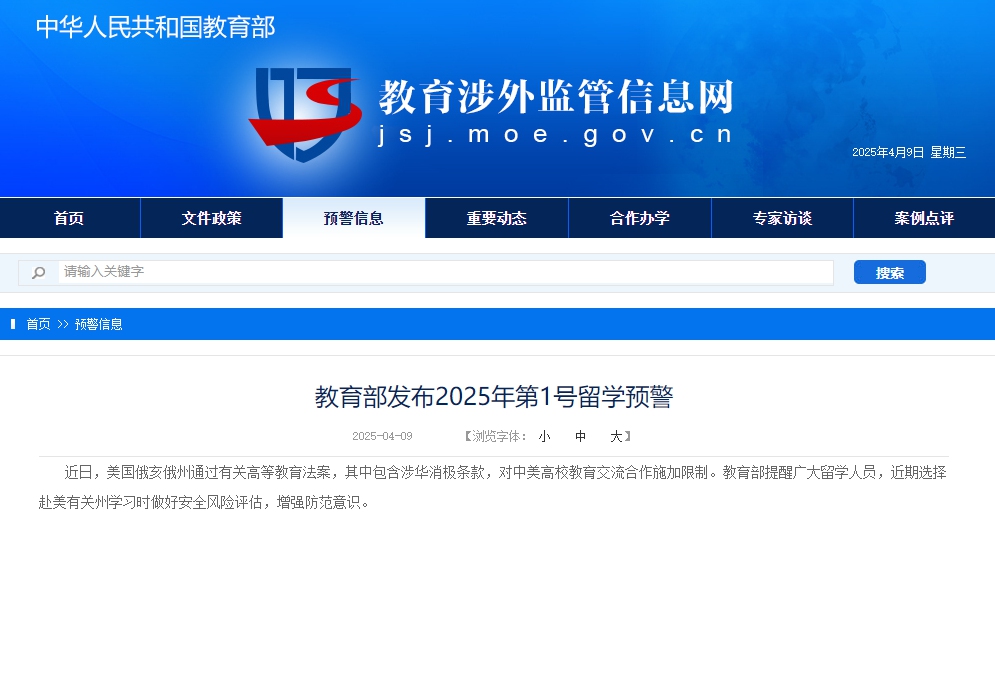
China's Ministry of Education issued the first study abroad alert for 2025 on Wednesday. According to the ministry, the state of Ohio in US has recently passed a bill on higher education that contains negative clauses related to China and imposes restrictions on educational exchanges and cooperation between colleges and universities in China and the US.
The Ministry of Education reminds all students to make a good security risk assessment and enhance their awareness of precaution when choosing to study in the relevant states in the US in the near future.
Meanwhile, China's Ministry of Culture and Tourism on Wednesday also issued a risk alert for Chinese tourists traveling to the US, citing the recent deterioration in China-US economic and trade relations as well as the domestic security situation in the US.
The Customs Tariff Commission of China's State Council announced Wednesday that China will raise additional tariffs for imported goods originating in the US to 84 percent from 34 percent from April 10.
On April 8, the US further increased the so-called "reciprocal tariffs" on Chinese products exported to the US to 84 percent from 34 percent. The US escalation of tariffs against China is a mistake on top of a mistake; it seriously infringes upon China's legitimate rights and interests and gravely undermines the rules‑based multilateral trading system, said the commission.
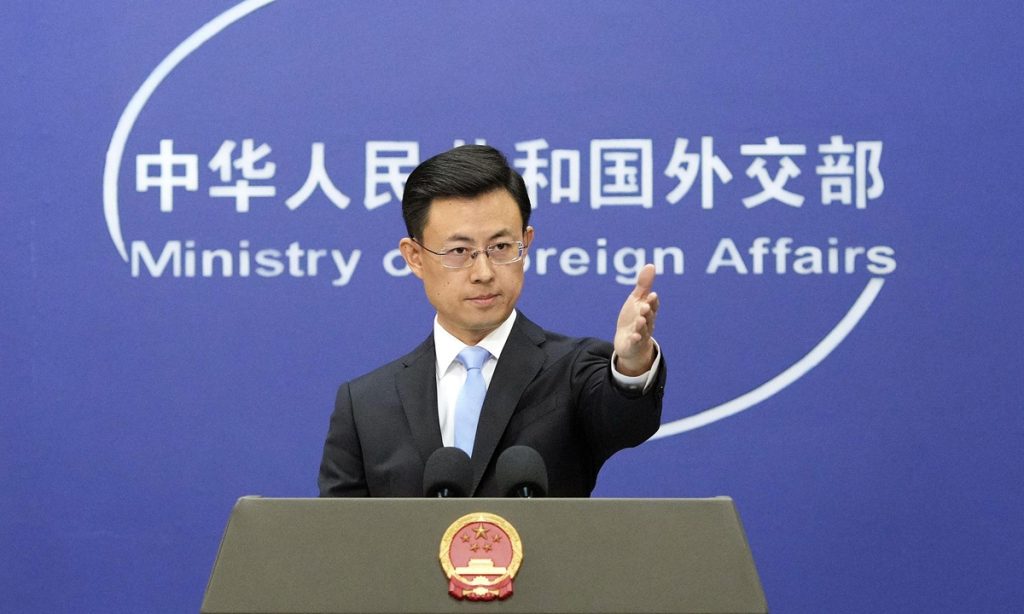
When asked about the 75th anniversary of diplomatic relations between China and India and China's assessment of the overall development of bilateral ties as well as future prospects, FM spokesperson Guo Jiakun said on Tuesday that, for today's anniversary, Chinese President Xi Jinping and Indian President Droupadi Murmu, as well as Chinese Premier Li Qiang and Indian PM Narendra Modi, exchanged congratulatory messages in this regard.
Guo said that China and India, both ancient civilizations, major developing countries, and important members of the Global South, are in a critical period of their respective modernization drives. The history of China-India relations demonstrates that becoming partners who achieve mutual success and realizing the "dragon and elephant dance" is the right choice for both sides, fully aligning with the fundamental interests of the two countries and their peoples.
China stands ready to work with India to follow the strategic guidance of both countries' leaders and to view and handle bilateral relations from a strategic and long-term perspective, and take the 75th anniversary as an opportunity to enhance strategic mutual trust, strengthen exchanges and cooperation across various fields, deepen communication and coordination on major international issues, jointly safeguard peace and tranquility in the China-India border areas, and steer bilateral relations toward sound and steady development, said Guo.
Another survivor pulled from rubble by Chinese rescuers in quake-hit Myanmar city Mandalay
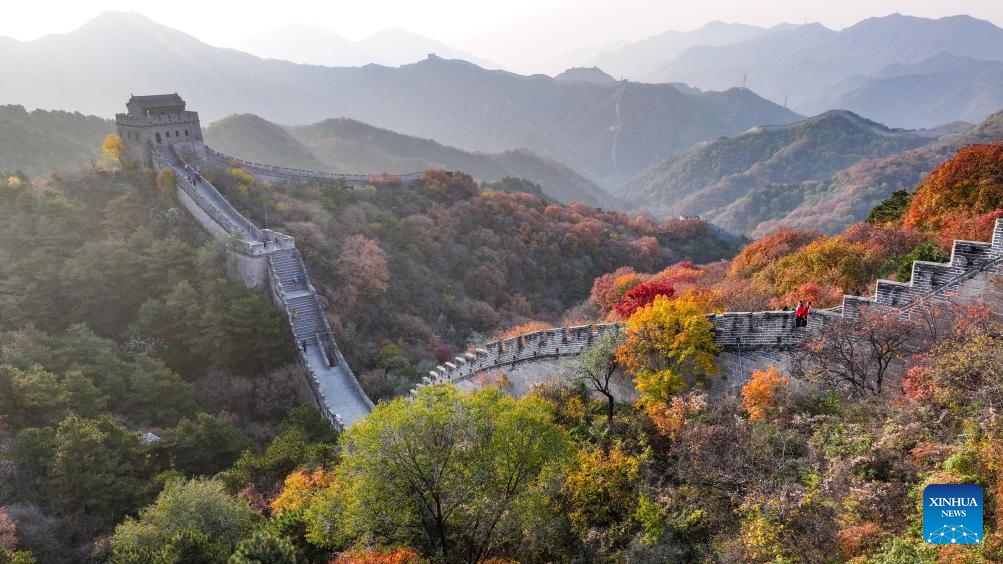
Two Japanese tourists were detained for two weeks in China, then deported, for taking photos showing exposed buttocks at the Great Wall, a World Heritage site, Japanese media reported. The incident has sparked heated discussions among netizens, with some Japanese commenting "It's shameful for these two Japanese tourists to behave so disgracefully at a historical site."
In early January, a Japanese man in his 20s traveling in China exposed his buttocks at the Great Wall in Beijing, while a Japanese woman accompanying him took photos, the Japan Times reported on Friday.
The tourists reportedly told the Japanese Embassy they did it as a prank. However, they were detained for two weeks for violating the Law on Penalties for Administration of Public Security, as their act of public nudity was deemed disruptive to social order, before being deported to Japan.
Japanese Foreign Ministry confirmed on Friday that "the Embassy of Japan in China confirmed on Jan 3 that two Japanese nationals were detained by local authorities at the Great Wall."
They were subsequently released and returned to Japan in January, the ministry said in a statement.
The Japanese Embassy in Beijing did not reply to requests for comment, as reported by the Japan Times.
Following the incident, Japan's NTV sent reporters to the site. A Japanese journalist expressed confusion over the tourist's behavior.
"The Great Wall is at a high altitude, and in January, temperatures can drop to -15 C. It's hard to understand why the man would take off his pants to expose his buttock for photos in such freezing weather," the journalist said.
This incident has been reported by several mainstream Chinese media outlets, including People's Daily news app and the official Wechat account of China Youth Daily. The incident, meanwhile, sparked heated debate among netizens in both China and Japan.
Some Japanese netizens commented, "it's shameful for these two Japanese tourists to behave so disgracefully at a historical site, two weeks' detention is too lenient," while others said, "Our country often complains about foreign tourists misbehaving, yet our own citizens are doing such things abroad."
In China, the topic ranked 11th on Sina Weibo's trending list by Friday noon, with many netizens expressed their indignation, saying they couldn't understand the tourists' behavior. There are also some netizens praising the approach taken by the local police, noting that those who lack etiquette should be dealt with by such punishments.
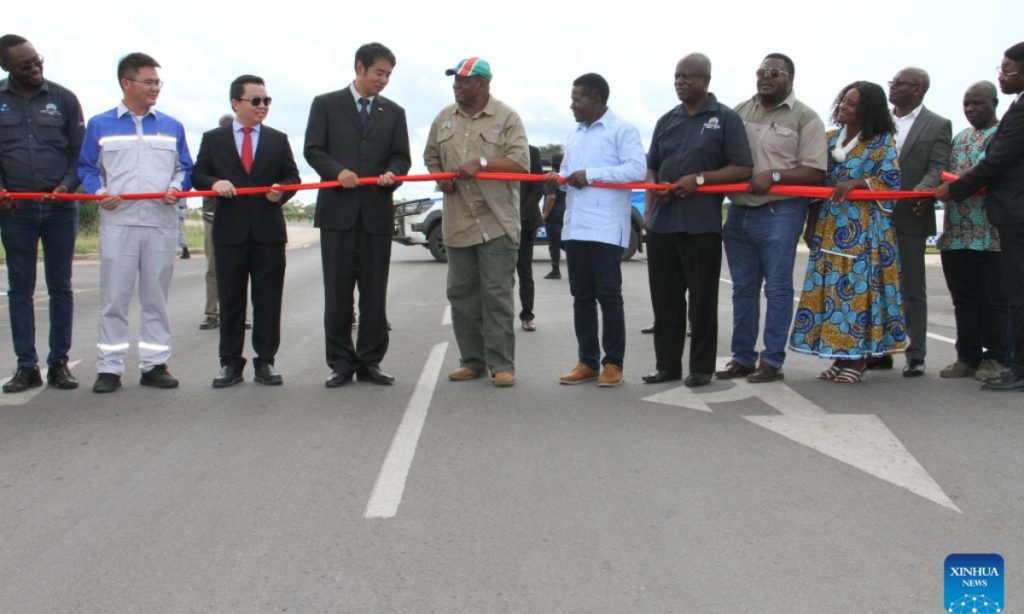
John Mutorwa Road, located in Rundu, in the Kavango East Region of northern Namibia, is celebrated as a major development that improves connectivity and boosts economic activity across local communities.
The road, constructed by China Henan International Cooperation Group (CHICO), was officially opened on Friday by its namesake, John Mutorwa, Namibia's deputy prime minister and minister of works and transport, marking a milestone for the region.
The Namibian government-funded project was completed last year and has since been lauded for its immediate impact on residents and businesses.
Jerry Kauyu, a consignment controller at the Agro-Marketing and Trade Agency (AMTA), which is responsible for the management of fresh produce business hubs, highlighted the road's role in facilitating accessibility and bridging previously separated communities.
"I'm an employee of AMTA, one of the beneficiaries of this newly opened road. We've been here since 2013, and this road is very significant because it has increased our traffic in terms of the people visiting the fresh produce hub and the community," said Kauyu in an interview with Xinhua. "We really appreciate this development, and it comes at a time that is very much needed for this dire industry."
Beyond improving transportation, the project has also created local employment opportunities.
Speaking at the official opening, Mutorwa noted that 61 unskilled workers from local communities had been employed during the construction phase, a testament to the government's commitment to building roads and creating economic opportunities for its people.
"This investment ensures that the community benefits from an all-weather reliable road that requires less maintenance while improving overall quality of life," he added.
Kennedy Chigumira, regional engineering manager at Roads Authority of Namibia, commended CHICO's efficiency and commitment to high standards. "Look at the quality of the work, and the adherence to engineering standards within specified timelines. CHICO managed to do it," Chigumira said.
Cui Yunke, managing director of CHICO in Namibia, told Xinhua that although the John Mutorwa Road project is modest in scale, it is one of the "small and beautiful" projects that have brought tangible benefits to local communities.
Wei Jinming, counselor for economic and commercial affairs of the Chinese Embassy in Namibia, noted that the smooth completion and successful handover of the road mark another achievement in China-Namibia cooperation and will effectively benefit local people.
"China will, as always, further strengthen cooperation between the two countries in various fields and promote the continued development of bilateral relations," he said.
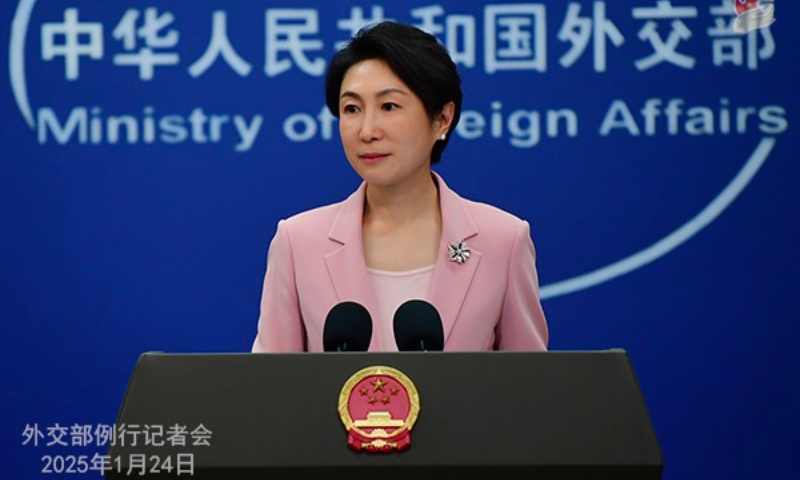
Commenting on a reporter's inquiry concerning that Taiwan regional authorities attempt to set up new overseas offices in certain countries or rename existing offices named after Taipei to Taiwan, Chinese Foreign Ministry spokesperson Mao Ning stated that the one-China principle is a universally recognized norm of international relations and a prevailing consensus of the international community, serving as the political foundation for China to establish and develop relations with other countries. The Government of the People's Republic of China is the sole legal government representing the whole of China. Taiwan is never a country, not in the past, and never in the future.
Mao pointed out at the Monday press conference that for some time, the Democratic Progressive Party (DPP) authorities have been using the pretext of exchanges and cooperation in fields such as economy, trade, science, technology, culture, and education, desperately attempting to breach the ironclad international commitment to the one-China principle. They seek to expand their so-called international space by resorting to tactics such as so-called "dollar diplomacy", bribery, coercion, and inducements, enticing certain countries to overstep boundaries or play ambiguous games on the Taiwan question, thereby undermining China's relations with those countries.
We sternly warn the DPP authorities that the complete reunification of China is an unstoppable trend, and pursuit of "independence" is ultimately a dead end, the spokesperson said. It is hoped the relevant countries recognize the malicious intentions of the Taiwan regional authorities and take concrete actions to strictly adhere to the one-China principle, safeguarding the political foundation of bilateral relations, Mao added.
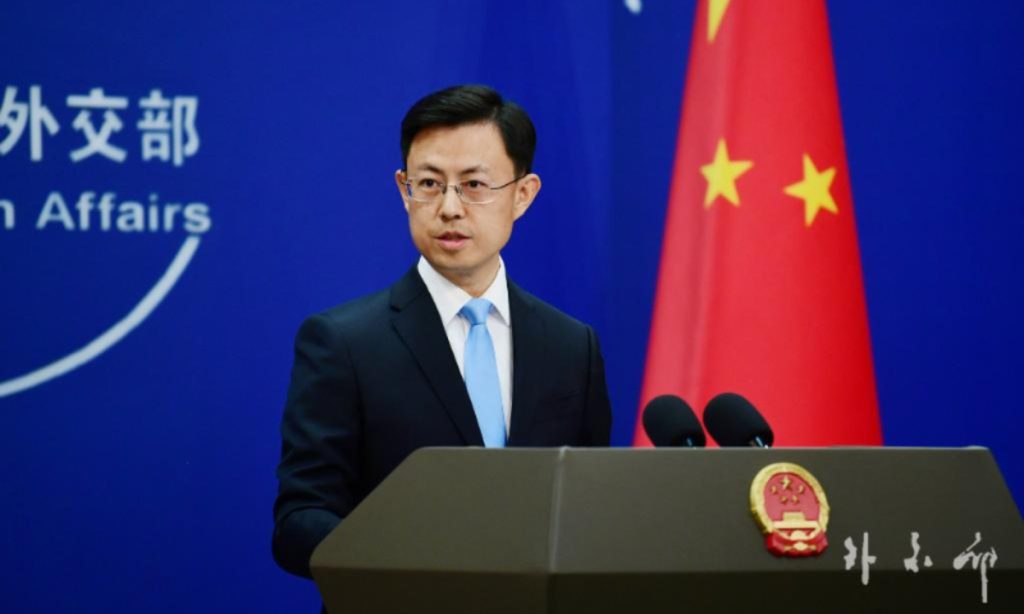
When asked to comment on the development of China-Russia cooperation and recent signs of a possible improvement in bilateral relations between Moscow and Washington in the future, Chinese Foreign Ministry Spokesperson Guo Jiakun stated that China and Russia enjoys a comprehensive strategic partnership of coordination for a new era. In recent years, under the strategic guidance of the two heads of state, China-Russia relations have remained unaffected by external interference, maintained healthy and stable development, and are at their best period in history. China-Russia cooperation is neither targeted any third party, nor influenced by any third-party factors.
China is willing to continue working with Russia to consolidate their permanent good-neighborly friendship and steadily advance all-round strategic coordination on the principles of non-alignment, non-confrontation, and non-targeting of any third party, continuously deepening mutually beneficial and win-win cooperation, the spokesperson said on Friday's routine press conference.
Friday marks the 75th anniversary of the signing of the Sino-Soviet Treaty of Friendship, Alliance, and Mutual Assistance. On February 14, 1950, the two sides signed the treaty and other agreements. The Foreign Ministers of the two countries exchanged three notes, declaring null and void the Sino-Soviet Treaty of Friendship and Alliance and the other agreements which were signed by the Soviet Government and the Kuomintang Government of China on August 14, 1945.